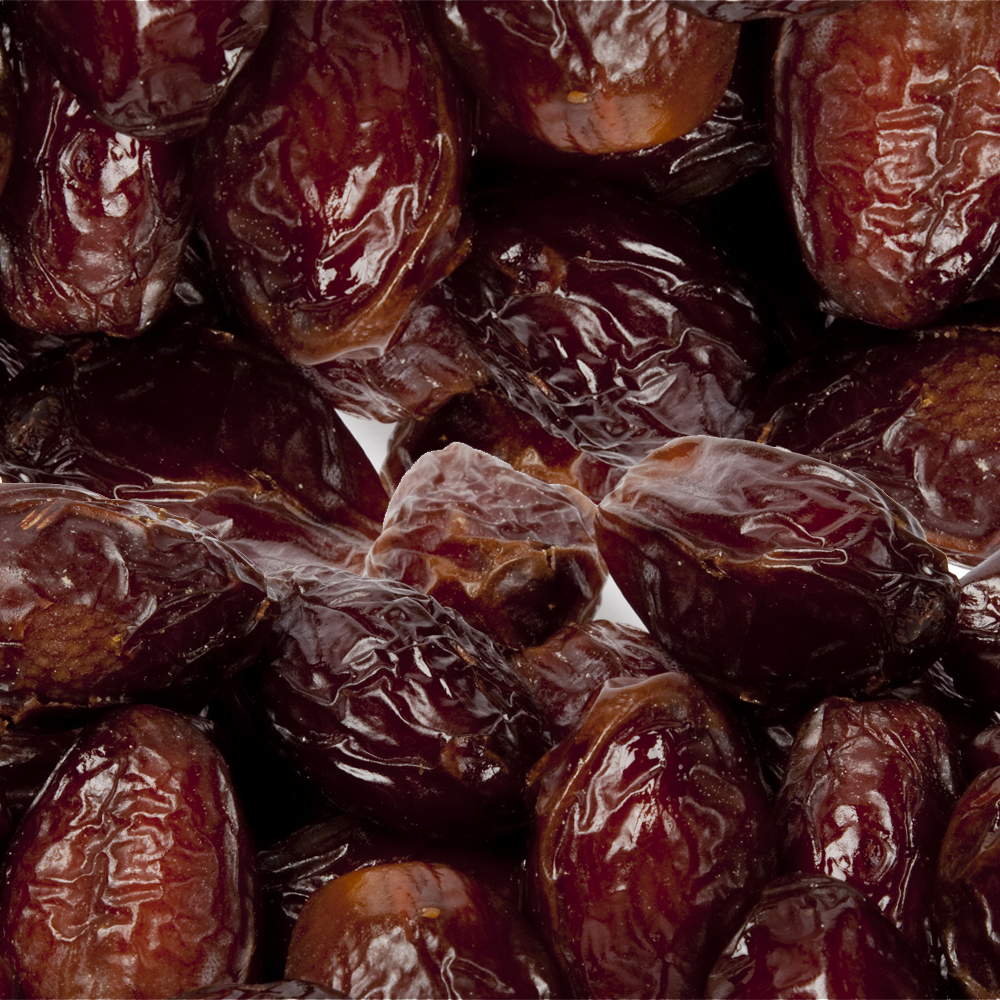
Medjool Dates: Nutritional Powerhouse and Debunking Date Myths
Kurma Medjool, often referred to as the “king of dates,” have captivated palates for centuries. Renowned for their luxurious texture, rich flavor, and impressive size, they are not just a delectable treat, but also a potential nutritional powerhouse. This blog post delves into the world of Medjool dates, exploring their unique characteristics, unpacking their nutritional value, and debunking some common myths surrounding dates in general.
The King of Dates: Unveiling the Allure of Medjool Dates
They stand out from the crowd with their distinct characteristics:
- Size Matters: they are significantly larger than many other date varieties, boasting a plump and elongated shape.
- Caramel Delight: Their flesh is soft and chewy, offering a delightful caramel-like sweetness with subtle hints of butterscotch.
- Naturally Luxurious: Due to their high moisture content and soft texture, they often require minimal processing, making them a naturally luxurious treat.
These characteristics contribute to the immense popularity of Medjool dates, but what about their nutritional value?
Beyond Delicious: Exploring the Nutritional Powerhouse of Medjool Dates
- Natural Sweetness with Benefits: kurma Medjool contains a significant amount of natural sugars, primarily fructose. However, unlike refined sugar, dates offer a source of fiber alongside the sweetness, potentially mitigating some blood sugar concerns.
- Fiber for Digestion: Dates are a good source of dietary fiber, which can promote digestive health and feelings of satiety.
- Essential Minerals: Medjool dates are a rich source of potassium, a crucial mineral for maintaining healthy blood pressure and fluid balance. They also contain magnesium, important for muscle function and energy production.
- Vitamins and Antioxidants: Dates offer a modest amount of vitamins and antioxidants, contributing to overall well-being.
While Medjool dates are a concentrated source of natural sugars, their fiber content and potential blood sugar benefits warrant further exploration.
Myth Busters: Debunking Common Misconceptions about Dates
Dates often fall victim to some common myths regarding their nutritional value:
- Myth 1: Dates are too high in sugar to be healthy. While dates do contain natural sugars, the presence of fiber alongside the sugar may help regulate blood sugar levels. Additionally, dates offer various essential nutrients that refined sugar lacks.
- Myth 2: Dates cause weight gain. Dates are a calorie-dense food, but in moderation, they can be part of a healthy diet. Their fiber content can promote satiety, potentially aiding in weight management efforts.
- Myth 3: Dates are not suitable for diabetics. While dates do contain sugar, some studies suggest they may not cause significant blood sugar spikes in individuals with controlled diabetes. However, moderation is key, and consulting a healthcare professional is always recommended.
By understanding these myths and the true nutritional value of dates, you can make informed decisions about incorporating them into your diet.
Sweet and Savory Delights: Incorporating Medjool Dates into Your Diet
These dates offer versatility beyond simply being a sweet treat:
- Natural Sweetener: Substitute the dates for refined sugar in baking or add chopped dates to smoothies and yogurt for a natural sweetness boost.
- Energy Bites: Blend the dates with nuts, seeds, and rolled oats for delicious and healthy energy bites.
- Savory Pairings: Their sweetness can complement savory dishes like cheese boards or stuffed poultry.
- Culinary Creativity: Experiment with incorporating chopped Medjool dates into sauces, salads, or tagines for a unique and flavorful twist.
Conclusion: The Majesty of Medjool Dates: A Celebration of Flavor and Nutrition
This exploration of Medjool dates unveiled a world of delicious possibilities:
- Myth Busters: We debunked common myths surrounding dates, including concerns about their sugar content, weight gain potential, and suitability for diabetics, promoting informed dietary choices.
- Sweet and Savory Delights: The post offered inspiring ideas for incorporating Medjool dates into your diet, exploring them as natural sweeteners, energy bites, savory pairings, and creative culinary applications.
Key Highlights
- Medjool dates are known for their large size, soft and chewy texture, and rich caramel-like flavor.
- Medjool dates offer a good source of natural sugars, fiber, potassium, magnesium, vitamins, and antioxidants.
- The presence of fiber alongside natural sugars in Medjool dates may help regulate blood sugar levels compared to refined sugar.
- Common myths regarding dates include concerns about their sugar content, weight gain potential, and suitability for diabetics. However, dates can be part of a healthy diet in moderation, and consulting a healthcare professional is always recommended for specific dietary needs.
- Medjool dates offer versatility beyond sweet treats, functioning as natural sweeteners, energy bites, savory pairings, and creative culinary ingredients.
With this newfound knowledge about Medjool dates, embark on your own date adventure and discover the world of flavor and health benefits these delightful fruits have to offer!